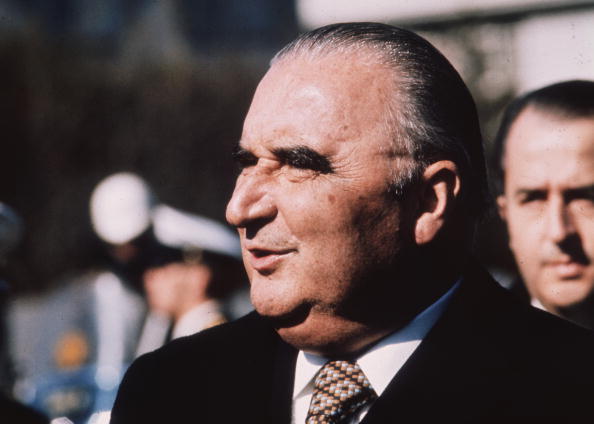What is Georges Pompidou's Net Worth?
Georges Pompidou was a French politician who had a net worth of $2 million at the time of his death. Georges Pompidou served as President of France from 1969 until his death in 1974. Prior to that, he was the longest-ever serving Prime Minister of France when he served under President Charles de Gaulle from 1962 until 1968. He is credited with modernizing France by launching the high-speed train project, pragmatic foreign policy, and supporting a more united Europe.
Early Life
Georges Pompidou was born on July 5, 1911 in Montboudif, France. He was the grandson of farmers of modest means on both his father's and his mother's sides. His parents worked as teachers. He attended Lycée Pierre-de-Fermat and then Lycée Louis-le-Grand. He then enrolled at the Ecole Normal Supérieure where he received his degree in literature. He began working as a literature teacher at a high school in Paris early in his career.
Career
In 1953, Pompidou was hired by Guy de Rothschild to work at Rothschild, a large bank in Paris. In 1956, he was appointed the bank's general manager. He held onto this position until 1962. He was later hired by Charles de Gaulle to manage the Anne de Gaulle Foundation for Down syndrome. De Gaulle's youngest daughter, Anne, had Down syndrome.
Beginning in 1962, Pompidou became the prime minister of France under President Charles de Gaulle after the former prime minister, Michel Debré, resigned. He served from April 14, 1962 until July 1968, and he still remains the longest-serving prime minster in France's history. Following Debré's death, he was nominated for the position which was controversial given he was not a member of the National Assembly. In October 1962, he was defeated by a vote of no-confidence. However, de Gaulle, who wanted Pompidou to become the prime minister, dissolved the National Assembly. The Gaullists then won the legislative election and Pompidou was reappointed as Prime Minister.
In 1963, Pompidou established the National Employment Fund which was designed to counter the negative effects on employment caused by industrial restructuring. In 1964, Pompidou was faced with a miners' strike, which he navigated well and prevented major disruption in the country. He was a critical part of the 1967 legislative campaign of the Union of Democrats for the Fifth Republic, leading the group to a narrow victory. He was also widely regarded as being responsible for the peaceful resolution of the student uprising of May 1968. His strategy was to break the coalition of students and workers by negotiating with the trade unions and employers.
The same year, in 1968, a disagreement arose between Pompidou and de Gaulle. Until that point, the two had had a very good relationship until de Gaulle decided to visit Baden-Baden, Germany without informing Pompidou. Their relationship became strained from then on, though Pompidou did lead and won the 1968 legislative campaign, which was considered a tremendous victory for the Gaullist Party. He then resigned.
However, because he was so well-regarded in France, he appeared to be the natural successor to de Gaulle. He announced his candidature for the Presidency in January 1969. After the failure of the 1969 constitutional referendum, de Gaulle resigned and Pompidou was elected president of France.

Keystone /Hulton Archive
Though a Gaullist himself, Pompidou was more pragmatic than de Gaulle. He was critical in facilitating the accession of the United Kingdom to the European Community on January 1, 1973, one of his most notable accomplishments. He also embarked on an industrialization and modernization plan in France. He initiated the Arianespace project and the TGV project, which brought a high speed train network to France.
After de Gaulle's departure from the presidency, the United States was eager to restore positive relations with France. New American President Richard Nixon and his top adviser, Henry Kissinger, admired Pompidou and the three were in agreement on many major policy issues. Pompidou also sought to maintain good relations with the newly independent former French colonies in Africa. In 1971, he visited Mauritania, Senegal, Ivory Coast, Cameroon, and Gabon. In general, he also sought to foster closer relations with North African and Middle Eastern countries in order to encourage more cooperation in the Mediterranean region.
Pompidou is also credited with his many efforts to modernize Paris. He spearheaded construction of a modern art museum, tore down the open air market at Les Halles to build a shopping mall, and built the Montparnesse Tower. He also constructed an expressway on the right bank of the Seine.
Personal Life and Death
Pompidou and his wife Claude had one adopted son together named Alain. Alain who went on the serve as president of the European Patent Office.
While still in office, Pompidou died on April 2, 1974 from Waldenstrom macroglubulinemia, a type of cancer. He was buried two days later and the official memorial service for him was held in Paris two days later, with 3,000 dignitaries in attendance. April 6 was declared a national day of mourning, with various cultural events cancelled and schools closed. France also withdrew from the Eurovision Song Contest 1974, which took place just four days after Pompidou's death, as a sign of respect.
Following his death, controversy arose surrounding the secrecy kept over Pompidou's illness. The political class in France agreed that future presidents of the country would have to be more forthcoming about their health by providing health reports, which Pompidou had not done. In fact, very few people were aware of his health condition at all until he died.


